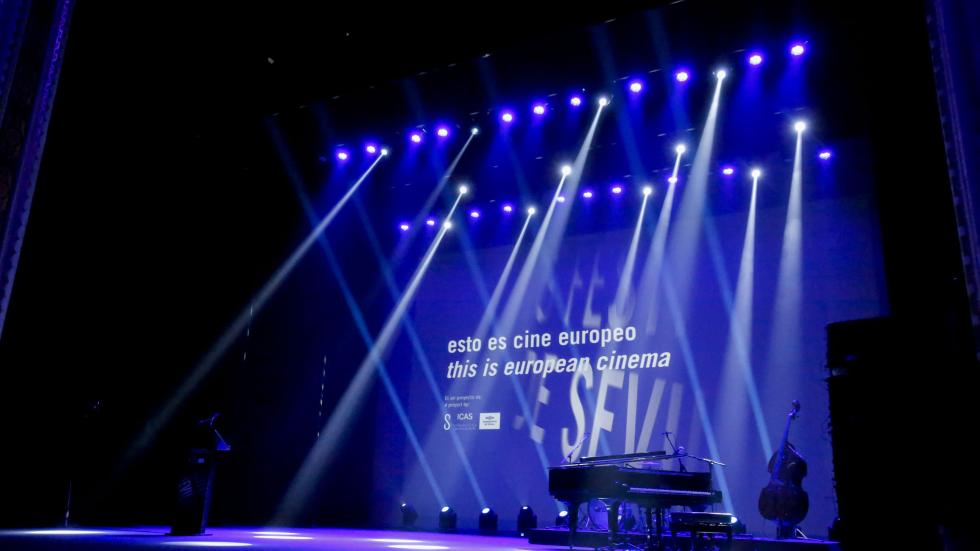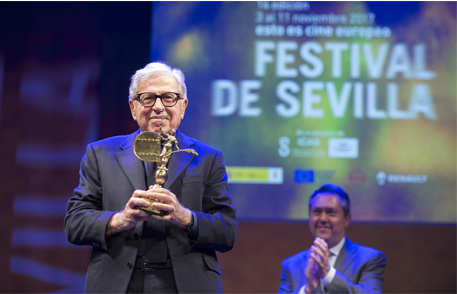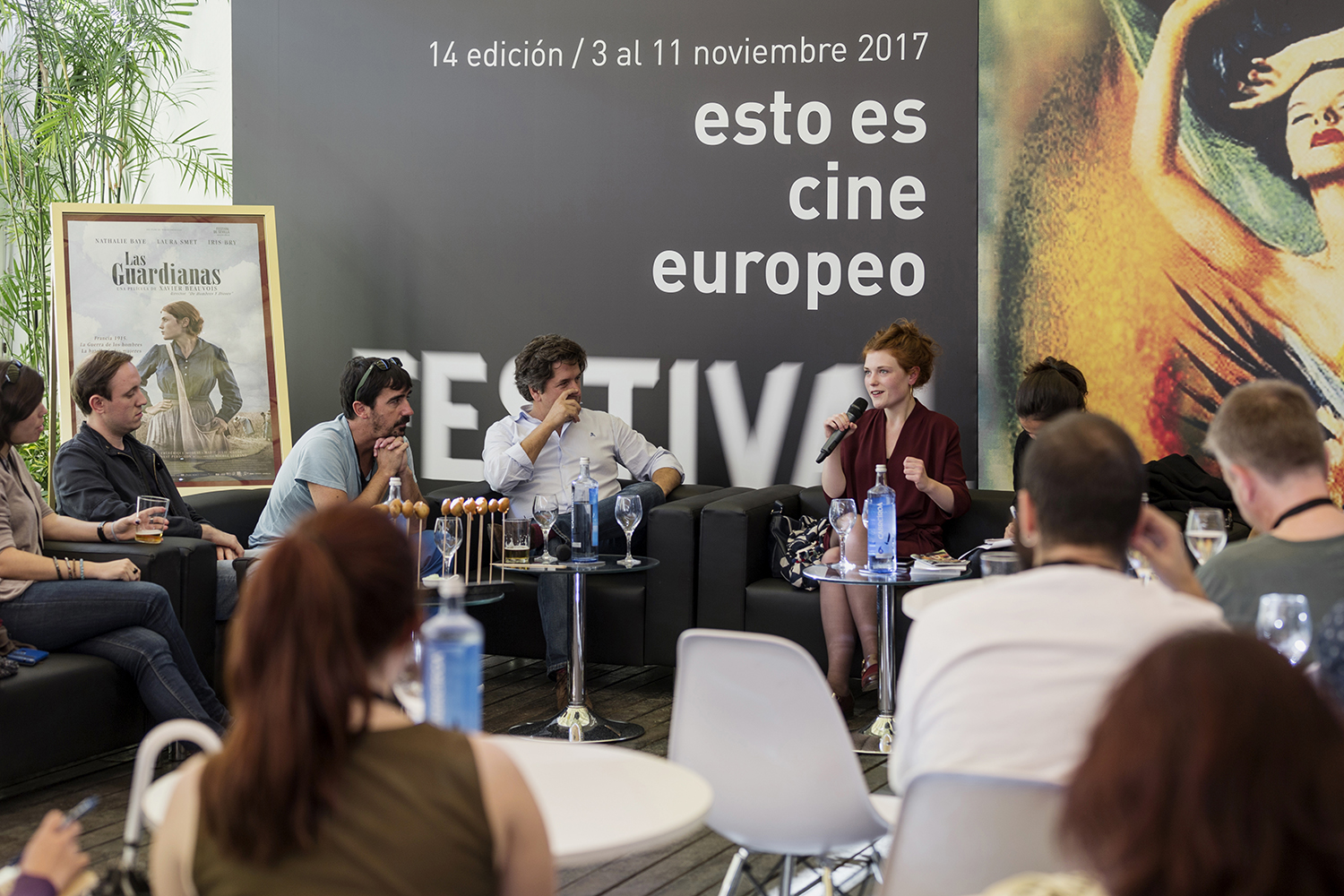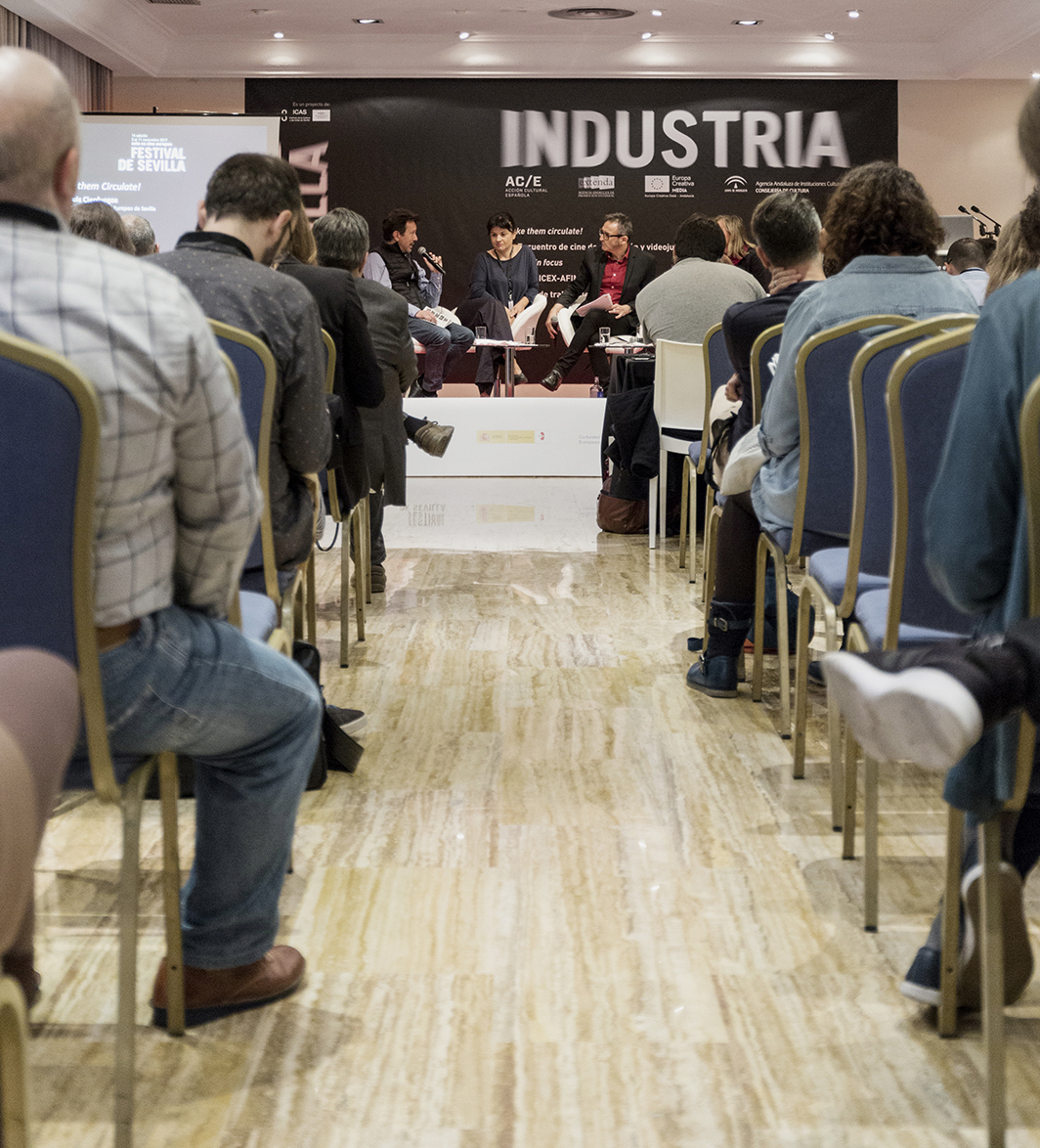
History
The aim of the Seville Festival is to promote and spread European cinema, establishing itself as an annual meeting place for European film talents, specialised journalists and professionals from the sector. Nine days during which industry, public and critics coexist in the midst of the best European cinema. Spanish premieres of the major films in contemporary auteurist cinema, the presence of a large number of emerging talents, the determined defense of the youngest Spanish cinema, support for Andalusian cinema and, above all, the total security that today, more than ever, a film festival can be useful to the public, to films and to filmmakers.
The main axis of the festival is made up of various competitive sections for feature films, documentaries, short films and non-fiction cinema. The other main axis consists of special screenings, tributes and retrospectives, with the aim of providing a complete view of contemporary European cinema. Also, each year the festival hosts the nominations ceremony for the European Film Academy Awards. In addition, in 2018, Seville was the venue for the European Film Academy Awards gala, an event that took place on 15th December in the Maestranza Theatre.

SEVILLE FESTIVAL HOSTED
The Seville Festival has received visits from legends and maestros such as Agnès Varda, Claude Lanzmann, Abel Ferrara, Pere Portabella, Stephen Frears, Carlos Saura, Bigas Luna, Roy Andersson, Milos Forman, Béla Tarr, Leos Carax, Abdellatif Kechiche, Ruben Östlund, Nicolas Roeg, Elia Suleiman, Paolo Taviani, Alexander Kluge, Alain Robbe-Grillet, Tonino Guerra, Andrzej Wajda, Nikita Mikhalkov, Peter Greenaway, Vittorio Storaro, Andrzej Żuławski, Mike Newell, Patrice Chéreau o Gianfranco Rosi.
The city and the festival have welcomed important filmmakers such asMatteo Garrone, Bruno Dumont, Olivier Assayas, Alain Guiraudie, Sergei Loznitsa, Teresa Villaverde, Eugène Green, Mia Hansen-Løve, Jessica Hausner, Philippe Grandrieux, Pedro Costa, Robert Guédiguian, Corneliu Porumboiu, Nicolas Philibert, Joanna Hogg, o Whit Stillman...
Also, authors with transformative views, como Pedro Pinho, Joachim Lafosse, Ulrich Seidl, Ado Arrieta, Bertrand Bonello, Nadav Lapid, Valeska Grisebach, Pietro Marcello, Justine Triet, Amos Gitaï, Christophe Honoré, László Nemes, Anna Odell, Albert Serra, With Stillman, Adina Pintilie, F.J. Ossang, Kurdwin Ayub, Mark Cousins, Jean-Charles Fitoussi...
We have been visited by established Spanish directors, such as Agustín Díaz Yanes, José Luis Guerín, Gonzalo García Pelayo, Juan Sebastián Bollaín, Lluis Miñarro, Josefina Molina, Paco León, Alberto Rodríguez, Rodrigo Sorogoyen, Ramón Salazar, Miguel Hermoso, Fernando Franco, Manuel Martín Cuenca o Isabel Coixet...
New voices of our cinema, como Oliver Laxe, Carlos Marqués-Marcet, Carlo Padial, Manuel Muñoz Rivas, Eloy Enciso, Pablo Llorca, Rocío Mesa, David Macián, César Velasco Broca, Hernán Zin, Elena López Riera, Carla Subirana, Eva Vila, Samu Fuentes, Anxos Fazáns, Lois Patiño, Oskar Alegria, Lucía Alemany, Adrián Orr...
And also such notable actors as Ben Kingsley, John Hurt, Christopher Lee, Kenneth Branagh, John Turturro, Vincent Lindon, Mathieu Amalric, Valeria Golino, Louis Garrel, Jeanne Balibar, Colin Farrell, María de Medeiros, Valeria Bruni-Tedeschi, Bárbara Lennie, Luis Tosar, Inma Cuesta, Antonio de la Torre, Oona Chaplin, Lola Dueñas, Marta Nieto, Antonio Banderas, Paz Vega, Timothy Spall, Franco Nero, Christopher Lee...

the public come face to face with european cinema
The festival has been a great success with the public, of whom it has never lost sight, always maintaining a closeness and complicity with its audiences, extending its activities beyond the films. These range from Q&A sessions between guest directors and the audience to seminars, exhibitions and concerts, all of which favour a real interaction between the city and the festival. Films for children and young people, in their important mission of creating an informed public, are also included in the festival, accompanied by a group of special activities involving teachers and pupils.

the focus on industry
Aware of the importance of creating networks and strengthening the production, distribution and exhibition of European cinema, the festival pays special attention to its industry activities. A complete programme that puts professionals from around the world in touch and facilitates the circulation of resources, contacts, knowledge and tools.
The Seville Festival is a project by Seville’s Institute of Culture and the Arts (Seville City Council). With the support of the Institute of Film and the Audiovisual Arts (Ministry of Education, Culture and Sport) and of the European Union’s Creative Europe.
With the collaboration of: the Junta de Andalucía through the Centro de Estudios Andaluces, Extenda, Agencia Andaluza de Promoción Exterior and the Agenda Andaluza de Instituciones Culturales, RTVA- Canal Sur, European Film Academy, Acción Cultural Española, AC/E, Fundació Bank Sabadell, Institut Français, Unifrance, TV5 Monde, Eurimages, Festival SCOPE, Art Cinema CICAE, Filmin, Austrian Cultural Forum, Swiss Films, German Films, Instituto Italiano de Cultura de Madrid, Fundación Tres Culturas del Mediterráneo, University of Seville_CICUS, European Moving Cinema Programme and ECAM-Escuela de Cinematografía y del Audiovisual de la Comunidad de Madrid. At present the festival is headed by José Luis Cienfuegos, who has been director since 2012. The first edition of the festival was held in 2001 (it also has antecedents in the 80s) under the name of the Seville Festival of Film and Sport, directed by José Luis Ruíz. In 2004 it became the Seville Festival of European Cinema. With its present name, the festival has been directed by Manolo Grosso (2004-2007) and by Javier Martín Dominguez (2008-2011).
the festival in figures
+230
films.
+130
national premieres.
+240
european talents.
460
screenings.
+130
Q&A.
60
workshops.
80.000
spectators in 2019.
+28.000
young audience.


